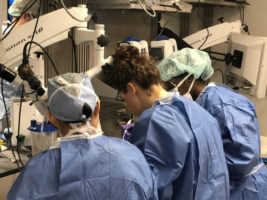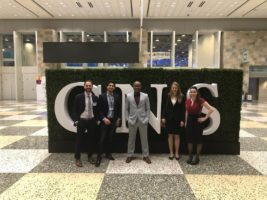A Message from the Program Director
Neurosurgical Residency Program
Thank you for your interest in the Neurosurgical Residency Program in the Department of Neurological Surgery at the University of Virginia (UVA). We hope to provide you insight into the curriculum and highlight the foundation of our successful training program. We seek residents who are committed to a life pursuing clinical and academic excellence and are passionate about the field of neurosurgery. We strongly believe that our training program provides the tools that will facilitate attaining the highest goals in our field.
Among the major strengths of UVA’s neurosurgery training program is the faculty’s commitment to resident education. As UVA faculty, we believe in education over service – a mantra often preached but poorly executed. The primary reason that we have chosen to be faculty at UVA is to foster the academic careers of residents, highlighting our commitment to the educational goals of the residency training program. This is the philosophical underpinning of our training program and the empiric basis of our success.
Resident training emphasizes patient selection, perioperative management, and operative techniques. Advancing these skills leads to optimal patient care and surgical outcomes. Our trainees benefit from a large clinical volume and a wide spectrum of diagnostic material that provide a broad exposure to all aspects of neurosurgery. There is also a firm commitment to keep our residents at the highest level of awareness with regards to changes in the socioeconomic, medicolegal, and the ethical practice of medicine. Residents finish the program with the skills, knowledge and confidence to meet every challenge encountered in the neurosurgical  discipline.
discipline.
The UVA neurosurgical training program is concentrated at the UVA Health System (UVAHS) and consists of seven years in a 6+1 model. Except for a one year international rotation, all clinical years (internship, junior residency, chief residency, fellowship/transition to practice years) are spent at UVAHS. Travel time between hospitals is eliminated, simplifying on-call duty hours and responsibilities, reducing stress, and allowing more time for the educational mission. Residents work together throughout their time at UVA leading to close bonds and lifelong friendships which contribute to the family atmosphere among the residents and attendings.
There are unique features to the training program that provide opportunities to gain diverse perspectives during your neurosurgical training. The residency program emphasizes early operative experience beginning with the intern year. Our PGY-1 residents perform over 100 major operations in preparation for the next two clinical years during which they routinely perform over 300 major cases per year. The PGY-4 year is a research year which allows the resident to pursue scholarly activities in their area of interests. Additionally, one can elect to complete a fellowship in neurocritical care or the first year of an endovascular neurosurgery fellowship during this time. The PGY-5 year consists of our international rotation in New Zealand (in either Auckland or Christchurch) and is considered a highlight of our training program by our graduates. The large surgical volume focuses primarily on intracranial pathology, including a large number of tumor and vascular cases. The faculty in New Zealand are excellent and committed to the training of independent surgeons. This year effectively prepares our residents for the busy clinical and administrative responsibilities of the Chief Resident/PGY-6 at UVA. The PGY-7 year is an opportunity for our residents to gain additional subspecialty training in one of our fellowship programs or to pursue additional research. The 6+1 model allows our residents to graduate from our program with subspecialty training.
The effectiveness of our training program can be measured in several different ways. Overall, this program has an amazing record for productivity in academic  Neurosurgery. Graduates have ascended to important roles in their respective academic departments and within national neurosurgical societies. The success and wellbeing of the former trainees is followed very closely. The feeling expressed by our trainees that they are part of a permanent neurosurgical family is important to us. Advancement in both clinical and academic areas is communicated among the faculty and to both former and current residents. Due to the success of this training program and faculty, there continues to be a guiding influence on the careers of our graduates.
Neurosurgery. Graduates have ascended to important roles in their respective academic departments and within national neurosurgical societies. The success and wellbeing of the former trainees is followed very closely. The feeling expressed by our trainees that they are part of a permanent neurosurgical family is important to us. Advancement in both clinical and academic areas is communicated among the faculty and to both former and current residents. Due to the success of this training program and faculty, there continues to be a guiding influence on the careers of our graduates.
Upon completion of the UVA Neurosurgical Residency Program, our graduates are excellent technical neurosurgeons. It is our most sincere desire that all of our residents will become better neurosurgeons than their mentors. Our expectation is that we will inspire our residents to commit to Neurosurgery as a life-long learning process and continue to improve the field throughout their careers. We should all share the goal to better our profession by developing new surgical techniques, appropriately utilizing new technologies, and applying laboratory advances that provide ever-greater safety and benefit for our patients. The goal of the UVA residency program is to provide young men and women with the guidance and expertise to accomplish this objective and to foster the passion for neurosurgery which is critical in having a successful career.
Follow news pertaining to our residency program on social media:
https://www.instagram.com/uvansgy
https://twitter.com/UVAneurosurg
https://www.facebook.com/UVaNeurosurgery
If you have any questions, feel free to contact me directly, or Program Coordinator Meaghan Upman at 434-243-6921, or mbt2a@virginia.edu. More information about residency programs at UVA can be found here: https://med.virginia.edu/gme/applicant-information/.
Heather Spader, M.D.
Assistant Professor and Program Director
